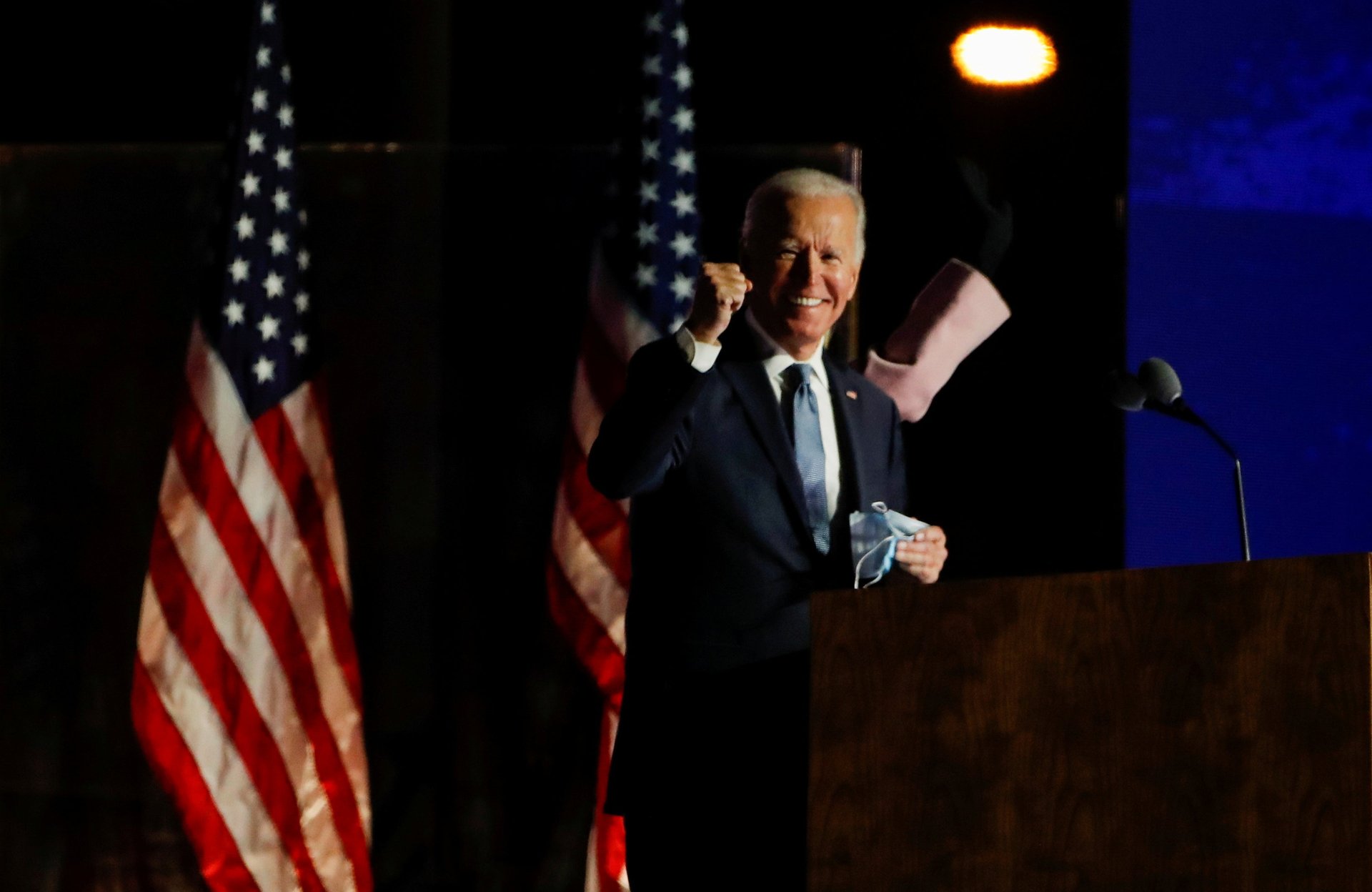Joe Biden wins the 2020 US presidential election
It wasn’t quite a “blue wave,” but Democratic candidate Joe Biden ultimately prevailed to become the next president of the US.


It wasn’t quite a “blue wave,” but Democratic candidate Joe Biden ultimately prevailed to become the next president of the US.
In a fiercely contested election whose outcome took days to tally, it came down to just a handful of battleground states—Wisconsin, Michigan, and Pennsylvania—and Democratic challenger Biden managed to narrowly clinch victory. AP has called it with 290 electoral votes, though the New York Times and NBC say 279. The tide turned in the mid-morning of Saturday (Nov. 7) as more votes in and around Philadelphia were counted, giving Biden a definitive lead in Pennsylvania.
The Biden team was careful not to declare victory as the US waited, but did display increasing confidence that the Democrats would occupy the White House come January, with Biden and his running mate meeting with public health experts and economists as coronavirus daily cases set new records.
In his victory speech Saturday night in Wilmington, Delaware, Biden emphasized unity and cooperation.
“For all those of you who voted for president Trump, I understand the disappointment tonight,” he said to a cheering crowd. “But now let’s give each other a chance. It’s time to put away the harsh rhetoric, lower the temperature, see each other again.”
Biden’s confirmed win comes after Trump falsely declared victory in a televised address from the White House in the early hours of Wednesday, despite results being far from clear at the time, and threatened to stop all vote counts. He also alleged without evidence or specifics that “fraud” was being committed on the American public, adding to his earlier accusation that Democrats were trying to steal the election.
Saturday afternoon, he again claimed unfounded irregularities and touted his performance.
Many experts and media outlets had expected the president to make such misleading remarks, which threatened to take the country down an unprecedented and uncharted constitutional path by directly undermining the integrity of the election process. Experts had already been warning for days that early returns might lean Trump, while mail-in ballots, which would take longer to finish counting in several states, could deliver the election to Biden.
It became clear early on Wednesday that the hope for a “blue wave” and Democratic landslide had not materialized, as Trump clinched Florida—crucial to a Republican win—and Ohio.
In the Senate race, Republicans held off Democratic challengers and retained control of the chamber, a key strategic priority of the GOP as it enables them to put up obstacles to the incoming Biden administration’s agenda. And in the House race, Democrats narrowly maintained their majority despite losing seats, and the post-mortem on that result will play out in coming weeks.
Trump now faces a lame-duck period before Biden’s inauguration in January. He has already filed numerous lawsuits, keeping himself, the courts, and lawyers busy for a while. A key question hanging over the US economy will be whether a stimulus package, discussions over which stalled before the election, will now get passed to help millions of Americans cope with the economic impact of the pandemic.
Meanwhile, the Biden team will be busy gearing up for the transition. Numerous policy issues rank high up on the president-elect’s agenda for the next four years, among them US-China relations and the climate.
Another thing for the new president to contend with: Even though Trump himself was defeated, it’s clear the ideas and grievances he stands for still resonate with many Americans. Speaking late Friday from Delaware, in what was not quite yet a victory speech, Biden sought to address both sides of that divide.
“We may be opponents, but we’re not enemies. We’re Americans,” he said. “We have to put the anger and the demonization behind us.”